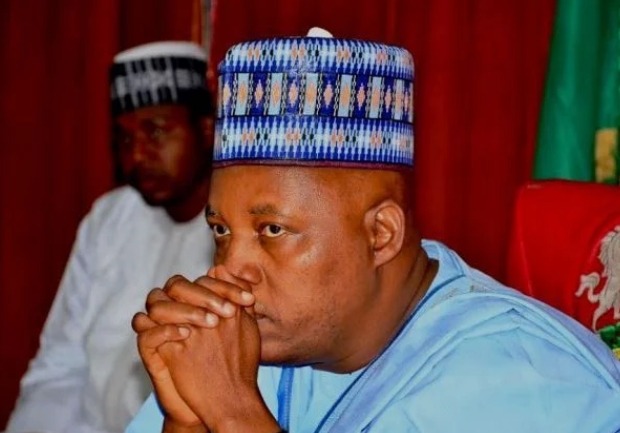News
Shettima: Ex-Borno Gov Who Wept Over Boko Haram Invasion

A former governor of Borno State, Kashim Shettima has been announced as running mate to the standard flagbearer of the All Progressives Congress, Bola Ahmed Tinubu.
The PUNCH reports that Shettima was announced on Sunday, July 10, 2022 following the announcement of the withdrawal of the placeholder for the position of running mate of the APC’s candidate, Ibrahim Masari.
However, there are controversies over the choice of Shettima as running mate to Tinubu.
Shettima, who is a banker and Muslim from the terrorist-ravaged Borno, will join Tinubu who is a Muslim from the South West on the Presidency ticket of the ruling APC, thereby, making the APC’s ticket a Muslim-Muslim ticket.
Muslim-Muslim ticket has been described by religious organisations such as the Christian Association to Nigeria, Pentecostal Fellowship of Nigeria, among others, as a threat to national unity.
In this piece, The PUNCH highlights memorable moments of the two-term governor whose tenure witnessed the heat of Boko Haram activities in Borno.
Insecurity in Borno
On January 2, 2019, the former Borno State governor during an extraordinary security meeting to discuss the worsening security situation in his state noted that he could not criticise the president, Major General Muhammadu Buhari (retd.), the same way they criticised former president Goodluck Jonathan over the insecurity in the North East.
READ ALSO: 15 Things To Know About Tinubu’s Running Mate, Shettima
Shettima was an ardent critic of the administration of Goodluck Jonathan over what he tagged as the failure of the administration to secure the lives of Nigerians in the north.
“Some persons have asked why I have not criticised the Buhari government or the Nigerian military over situations in Borno. My response to them is that unlike in previous years when I was treated as an enemy of the Presidency, I have from 2015 to date, gained unfettered access to the President.
“I see the Commander-In-Chief at the shortest request and I tell him my concerns, he listens to me with keen interest and in most cases, he takes measures. I have not had reason to be frustrated with the Presidency, unlike previous years,” Kashima had said at the meeting.
Shettima’s tears at Aso Villa
On Monday, January 7, 2019, The PUNCH reported how Shettima broke down in tears before Buhari in Abuja at the Council Chambers of the Presidential Villa, urging the President to do all he could to stop the insurgents, who now attack communities at will.
The governor had gone to the Villa in company with Borno elders to meet with Buhari in order to seek further ways of addressing the resurgence in attacks by Boko Haram.
Others at the meeting were the National Security Adviser, Maj. Gen. Babagana Monguno (retd.); who is also from Borno State; former Chief of Defence Staff, Gen. Gabriel Olonisakin; acting Director General of the National Intelligence Agency, Ahmed Abubakar; and the Director General of the Department for State Services, Yussuf Bitchi.
Three killed in Shettima’s convoy
On February 13, 2019, The PUNCH reported how three persons were killed in the convoy of Shettima, during an attack by Boko Haram insurgents.
Shettima, who was governor at the time, was travelling to Gamboru-Ngala on political campaign when his large convoy ran into an ambush between Dikwa and Gamboru.
Sources who spoke to The PUNCH said there was an exchange of gunfire and three persons believed to be party supporters who had joined his convoy on the campaign were killed.
While commenting on the matter, Shettima had said, “The Boko Haram basked in the oxygen of publicity, by attacking my convoy, by targeting my person, they have gotten the much needed boost. But then as they say, if you cannot withstand the heat, get out of the kitchen.”
READ ALSO: Why I Chose Shettima As Running Mate — Tinubu
On Monday, December 14, 2020, Shettima who featured on a programme on Arise Television, shortly after the abduction of hundreds of students from a government owned secondary school in Kankara, Katsina State, cautioned Nigerians against criticising the failure of the regime of Muhammadu Buhari to tackle insecurity.
“We respect him. We cherish him. We love him. But don’t deify him because deification is [for] God. Buhari is not God. If there are things that need to be corrected, we are going to point it out to him equivocally and unambiguously, but without playing to the gallery,” he had said.
The senator said the service chiefs have done their best but “their best is no longer enough,” adding, “Justice, equity and fairness, even common sense demand that these service chiefs should go”.
He said, “There’s been some improvement in the security landscape in the state (Borno) especially in the first two years of the Buhari administration”.
PUNCH
News
Court Dissolves Petitioner’s Marriage Over Lack Of Love, Care

An Area Court sitting at Centre-Igboro, Ilorin in Kwara State, on Thursday, dissolved the four-year-old marriage between Aminat Mustapha and Wahab Adeshina, following the petitioner’s insistence.
The petitioner told the court that she was no longer interested in her marriage to her husband following claims of lack of love and care.
According to the News Agency of Nigeria (NAN), while delivering ruling, the presiding judge, Mr Toyin Aluko, held that the respondent had written to the court, accepting the divorce application made by his wife.
READ ALSO:Why I Charged My Husband Money For Sex —Woman
Aluko, consequently, dissolved the marriage between the parties, and ordered the woman to observe one month iddah (waiting period) before she could remarry.
Meanwhile, the court granted custody of the two children in the marriage, ages one and three, to their mother.
He ordered the father to pay a monthly sum of N20,000 for the children’s feeding and maintenance.
The court also held that the respondent will be responsible for their education and healthcare.
Again, the court held that the father has unrestricted access to his children, but at reasonable time adding that he should be notified before any decision is taken on his children.
The judge ordered the petitioner to get a copy of the judgment and send same to the respondent.
News
Tinubu Embarks On Three-state Visit

President Bola Ahmed Tinubu will depart Abuja on Saturday on a working visit to Borno, Bauchi and Lagos.
This is contained in a statement issued by Presidential Spokesperson, Mr Bayo Onanuga, on Friday in Abuja.
While in Borno, the President will commission projects executed by the Borno State Government under Gov. Babagana Zulum, in collaboration with the Federal Government.
He will also attend the wedding ceremony of Sadeeq Sheriff, son of former Borno Governor, Sen. Ali Modu Sheriff, and his bride, Hadiza Kam Salem.
READ ALSO:Ambassadorial Nominees: Ndume Asks Tinubu To Withdraw List
From Maiduguri, Tinubu will proceed to Bauchi State to condole with the state government and the family of Sheikh Dahiru Bauchi, the renowned Islamic cleric and leader of the Tijjaniyya Muslim Brotherhood.
Sheikh Dahiru Bauchi died on Nov. 27.
After the condolence visit, the President will travel to Lagos, where he will spend the end-of-year holidays.
During his stay in Lagos, Tinubu is expected to attend several engagements, including the Eyo Festival scheduled for Dec. 27.
The festival, to be held at Tafawa Balewa Square, will honour notable personalities, including the President’s late mother, Alhaja Abibatu Mogaji, former Lagos State governors Alhaji Lateef Jakande and Chief Michael Otedola.
News
My Wife Dented My Image, Took Our Marital Crises To Radio Stations — Husband

…He ran away from home after I was delivered of twins —Wife
Grade A Customary Court sitting at Mapo, Ibadan, Oyo State, has ruled that a couple, Folaji and Ifedayo should go their different ways after it pronounced their marriage dissolved.
The court president, Mrs S.M Akintayo, who gave the judgment, stated that this was imperative to dissolve the marriage for peace to reign.
The plaintiff, Folaji, who dragged his wife to court, accused her of not loving him, always fighting him, and sometimes displaying violence.
Folaji explained that the root of their differences was Ifedayo’s bias for his mode of worship.
According to the plaintiff, he attends a white garment church, which mode of worship the defendant abhors and therefore refused to attend services with him.
Folaji also said that Ifedayo concealed from him the fact that she was suffering from a particular ailment, which he became aware of after she was advised at the hospital to carry out series of tests.
Folaji stated that the differences between him and his wife degenerated to the level that he became a regular face at the police station and also at radio stations, where his wife took their matters to.
READ ALSO:‘My Husband Kept Coffin Under Our Bed, Planned To Use Our Child For Ritual’
The plaintiff told the court that the defendant had done a lot of damage to his image, and thus prayed the court to put an end to their relationship so that he could pick up the pieces of his life.
The plaintiff sought easy access to their children and promised to give them feeding allowance weekly.
He further requested an order restraining his wife from threatening him and from interfering with his private life.
Ifedayo, in her response, agreed that their union be dissolved.
She stated that her husband was inhumane and that he packed out of their house before she was discharged from the hospital after she put to bed a set of twins.
The defendant further said that the plaintiff had never visited her and their children since he walked out of their marriage.
According to her, her husband sent her N20,000 through his counsel after he dragged her to court, but that she declined it because it was a ridiculous amount to feed a set of twins.
Folaji, in his testimony, said: “My lord, my wife, and I had a proper wedding, and I paid her bride price.
“I expected my wife to be submissive to me and do my binding, but the reverse is the case.
“My wife is stubborn and troublesome.
READ ALSO:My Husband Felt Insecure After I Got A Job, Accused Me Of Infidelity —Wife
“She swore never to attend my church because it’s a white garment church and that she loathes our way of worship.
“The more I encouraged her to attend, the more she kept her distance.
“She later reluctantly agreed to attend service once a month.
“My wife is secretive. She hid from me for years the fact that she was nursing an ailment. I only became aware of this when the doctor confirmed it after she went through a series of tests when she took ill.
“My wife, rather than being remorseful, decided to make life tough for me.
“She became troublesome and never ceased to fight me.
“She is violent and always hit and harmed me with any dangerous objects within her reach.
“We always dragged ourselves to the police station where we became a regular face.
“My wife, determined to dent my image, took our issues to radio stations where I was invited and our differences were aired.
READ ALSO:My Husband Felt Insecure After I Got A Job, Accused Me Of Infidelity —Wife
“I walked out of our marriage when I could no longer tolerate my wife’s misbehaviour.
“She reported me again at the welfare office and, after mediating in our differences, I was asked to provide her with foodstuff and not money, which I did on a regular basis.
“But she has insisted that I would not have rest of mind.
“I pray this court to dissolve our marriage and grant me free access to our children. I promise to make provision for their upkeep on a weekly basis.
“I further request an order restraining my wife from threatening and interfering with my private life.”
Ifedayo, in her response, said: “I agree that our marriage be dissolved. My husband is inhumane and has no conscience, which were the causes of the crisis we experienced in our marriage.
“I was admitted in the hospital to be delivered of our set of twins, but I returned to meet an empty house. My husband deserted me and our newborn children.
READ ALSO:My Husband Shows His Other Wives More Affection, Woman Tells Court
“He never checked on them nor gave anything for their upkeep. He only gave them N20,000 of recent through his counsel after he came to court.
“I rejected the money because such an amount can not feed sufficiently two children of their age, not to mention other needs.
“I plead that the court grant me custody of our children and make my husband responsible for their upkeep.
“I want him to give attention to their feeding and pay their school fees as and when due.
“He should likewise be available any time they need medical attention.”
Giving her judgment, Mrs Akintayo said although both had a valid customary marriage and bride price was paid, the court had no choice than to grant their prayers of divorce since they now express their disinterest in it.
Akintayo ruled that they were no longer husband and wife.
She granted custody of their children to the defendant, stating that they were still minors in need of motherly care.
The defendant was granted access to their children on a weekly basis while he was ordered to be responsible for their welfare.

 News4 days ago
News4 days agoWage Dispute: Court Orders PSG To Pay Mbappe €61 Million

 Headline4 days ago
Headline4 days agoAircraft Crashes In Owerri With Four Persons Onboard

 Sports4 days ago
Sports4 days agoJUST IN: Dembélé Named FIFA Best Men’s Player, Bonmatí Wins Women’s Award

 Metro3 days ago
Metro3 days agoAlleged Organ Harvesting: Bereaved Families Rush To Check Corpses

 Business4 days ago
Business4 days ago9th FirstBank Digital Xperience Centre Launched In UNIBEN

 Business4 days ago
Business4 days agoCBN Revokes Licences Of Aso Savings, Union Homes As NDIC Begins Deposit Payments

 News4 days ago
News4 days agoOkpebholo Presents ₦939.85bn ‘Budget Of Hope, Growth’ To Edo Assembly

 News4 days ago
News4 days agoTrump Places Nigeria, 14 Others On Partial Travel Restrictions To US

 News3 days ago
News3 days agoForest Reserve: Okpebholo Broker Peace Between Host Communities, Investors

 News4 days ago
News4 days agoOPINION: Man-of-the-people, Man-of-himself






























